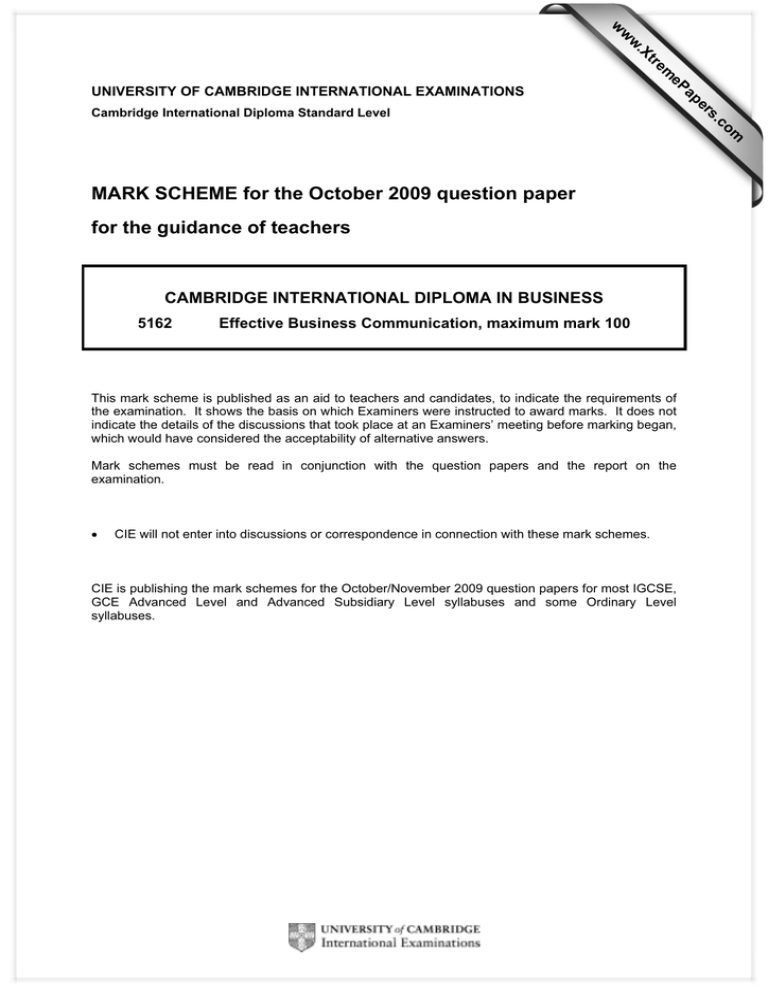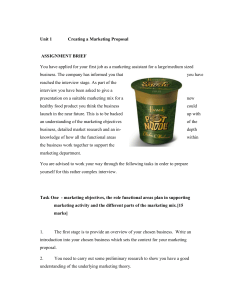MARK SCHEME for the October 2009 question paper
advertisement

w w ap eP m e tr .X w UNIVERSITY OF CAMBRIDGE INTERNATIONAL EXAMINATIONS om .c s er Cambridge International Diploma Standard Level MARK SCHEME for the October 2009 question paper for the guidance of teachers CAMBRIDGE INTERNATIONAL DIPLOMA IN BUSINESS 5162 Effective Business Communication, maximum mark 100 This mark scheme is published as an aid to teachers and candidates, to indicate the requirements of the examination. It shows the basis on which Examiners were instructed to award marks. It does not indicate the details of the discussions that took place at an Examiners’ meeting before marking began, which would have considered the acceptability of alternative answers. Mark schemes must be read in conjunction with the question papers and the report on the examination. • CIE will not enter into discussions or correspondence in connection with these mark schemes. CIE is publishing the mark schemes for the October/November 2009 question papers for most IGCSE, GCE Advanced Level and Advanced Subsidiary Level syllabuses and some Ordinary Level syllabuses. Page 2 1 Mark Scheme: Teachers’ version Cambridge International Diploma – October 2009 Syllabus 5162 John has asked you to prepare some notes giving reasons why it is important that Yaklin communicates the changes to its customers. (a) Suggest four reasons why it is important for Yaklin Insurance to communicate effectively with its customers. [4 × 2 = 8] Answers should include: • • • • • • • To communicate the changes underway at Yaklin Insurance and how it might affect their insurance policies To communicate the way in which they undertake future insurance related transactions Being able to find out customer needs and wants Being able to ensure customers have the opportunity of feedback on their views and experiences Need to be able to provide the customer with helpful information via the website Need to develop and maintain a relationship with customers, particularly as the business is moving to purely online transactions Necessity for a business such as Yaklin Insurance to continue be successful (2 marks per point – 1 mark for identification and 1 mark for elaboration) (b) Suggest three factors that should be considered when choosing the most appropriate method of communication for external customers. [3 × 2 = 6] • • • • • • • Need to consider the reputation of the organisation externally Need to consider the formality of the communication Need to consider the level of feedback required Need to consider the skills required by communicators with external customers Need to consider the different needs of the customers Need to consider cost involved Need to consider the accessibility of the customer to the communication (3 × 2 marks). Only one mark per point should be awarded if the student provides only a bullet point with no elaboration. (c) Explain three methods of two-way communications you and John could use to involve the project team and other staff in developing ideas to support the new business processes. [3 × 2 = 6] • • • • • Team briefings Team meetings Brain storming/idea generation meetings Quality circles Seminars Forms of written communication should not be accepted. (2 marks per point – 1 mark for identification and 1 mark for elaboration) [Total: 20] © UCLES 2009 Page 3 2 Mark Scheme: Teachers’ version Cambridge International Diploma – October 2009 Syllabus 5162 (a) Write a letter to Yaklin’s customers, telling them about the changes in the business. Use the details in the case study. You may create all other details. [12 marks] The letter should conform to the following format: • • • • • • • • • • Logo or letterhead of the company Date Reference number Appropriate salutation – Dear Mr/Mrs Letter heading Appropriate closure Signature and position Response mechanism The body/content of letter, explaining the new process Explanation of new online business [2 mark] [2 mark] [2 mark] [Format – 6 marks] [Content – 6 marks – levels below] The content and tone of the letter should be polite and persuasive, detailing the new online Internet business solution. The letter should also summarise by explaining what the next stage will be to order i.e. send in attached slip or email. Level 1: demonstrates limited content and persuasion. Level 2: demonstrates a good tone appropriate and persuasive content. [1–3 marks] [4–6 marks] (b) Give four advantages to the customers of Yaklin’s business going ‘online’ and using the Internet for its domestic insurance market. [4 × 2 = 8] • • • • • • 24/7 access Easy to access information Easy to evaluate information Undertake insurance transactions online Do not have to wait for telephones to be answered Get early confirmation of the insurance transaction (1 mark for identification and 1 mark for elaboration) [Total: 20] 3 (a) Explain four reasons why it is important to establish smaller groups, such as the Online Project Group, to support business activities in a large organisation. [4 × 3 = 12] • • • • To engender a sense of belonging – group members may be better motivated as a result of this To achieve common goals – to ensure that all group members are working to the same ends To ensure that there is an exchange of good practices within the workplace To effectively share the work-place – i.e. to share resources, share space and work well together (Marks should be allocated on the basis of 3 marks per point for points – 1 point for identification and two for elaboration) © UCLES 2009 Page 4 Mark Scheme: Teachers’ version Cambridge International Diploma – October 2009 Syllabus 5162 (b) Explain four ways of ensuring that the project team meetings are successful. [8] Students should be able to identify four from the following: • • • • • Desired aims have been identified Members have an interest in the decisions and outcomes Action points are identified and followed up Meeting takes place in a limited timescale Appointing someone to chair or lead the meeting (2 marks per point – 1 for identification and one for elaboration – maximum of four points required) [Total: 20] 4 You have been asked by John to recruit a new team member with database experience. He is concerned that the database administrators are not going to be able to cope with the added pressure that the automation will bring to the business. (a) Identify six things you will need to plan for a recruitment interview. [6 × 2 = 12] Need to plan the interviews: • • • • • • • • • • Consider the aims and purpose of the interview Need to decide who should be present at the interview Need to consider type of questions – open, leading, scenario base, etc. The discussion should largely go backwards and forwards from the interviewer to the interviewee so that the interviewer maintains the position of controlling the proceedings The interviewer will also need to set the general tone of the interview which will reflect the relationship of the parties and nature of the discussion Need to choose an appropriate location and time and collect all necessary background data that will set the structure for the interview i.e. personal specification, job specification, selection criteria Need to listen carefully for information expressed by the interviewee. Need to consider how this is to be recorded Need to make notes on critical issues during the course of the interview and close with a summary of the main points raised, highlighting the next stage of the process i.e. when the decision will be made After the interview, need to spend a few minutes making additional notes that may be useful for reference later, whilst the interview is fresh in the mind Need to consider the acceptance and rejection letters after the interview to the appropriate people Level 1: demonstrates limited knowledge and understanding Level 2: demonstrates a clearer understanding of planning stages Level 3: analyses appropriate stages Level 4: excellent analysis of appropriate elements (Candidates must develop any point made for 2 marks) © UCLES 2009 [1–3 marks] [4–7 marks] [8–10 marks] [11–12 marks] Page 5 Mark Scheme: Teachers’ version Cambridge International Diploma – October 2009 (b) Identify four features of a successful recruitment interview. • • • • • Syllabus 5162 [4 × 2 = 8] A planned and controlled communication between two or more people Enables all parties to speak and listen Should be arranged at a mutually convenient time Should be an opportunity for a mutual sharing of information about the interviewee and the employing organisation Should have an outcome which may be followed up in writing (1 mark for identification and 1 mark for elaboration) [Total: 20] 5 John is aware that sales of insurance policies may decline as a result of the change, although in the long-term he expects an increase. (a) Describe four different types of graph which John could use to present Yaklin’s monthly sales information in his monthly management report. Give reasons for choosing each graph. [4 × 3 = 12] Pie charts – explanation of pie charts, total value of items must be known, use of colours to enhance impact, limited to the amount of in-depth information that can be conveyed using a pie-chart, need to work out in terms of 360%. Line graphs – explanation of line graphs – good for showing trends, cannot readily or clearly be interpreted as there are too many plotted lines of information, therefore not helpful for complex information. Bar charts – explanation of bar charts – good for indicating trends, wide range of bar charts available, difficult to present complex information. Tables – explanation of tables – good for tabulating complex information, limited immediate visual impact and difficult to interpret readily. (1 mark for identification of each point and 2 marks per point for elaboration) (b) Explain four ways in which different computer software packages could enhance the presentation of the sales reports. [4 × 2 = 8] • • • • • Models can be produced – 3D to visualise more effectively Full colour can be used Integration with other IT packages for an effective presentation such as Power Point Integration with other multimedia aids such a talking heads etc. Information can be produced as progressive information (1 mark for identification and 1 mark for elaboration) [Total: 20] © UCLES 2009






